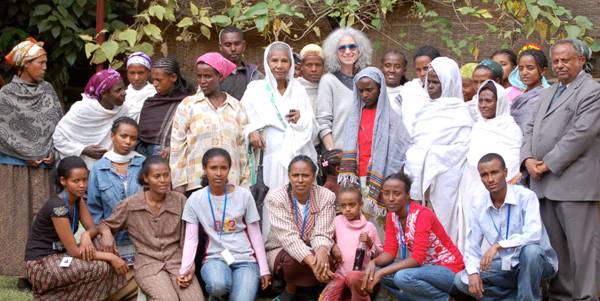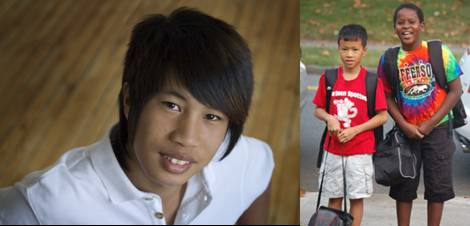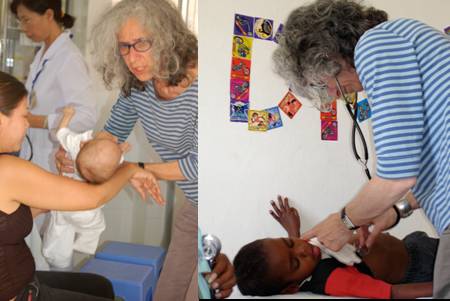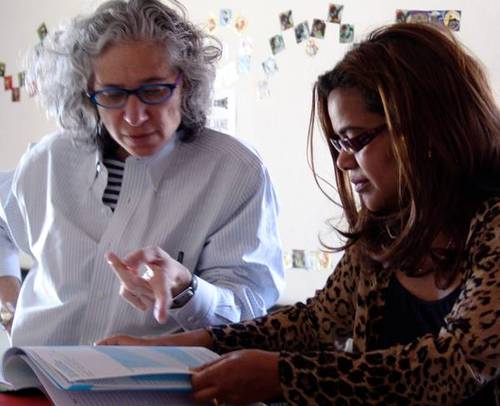 Jane Aronson at the WWO Academy in Ethiopia with family and community members.
Jane Aronson at the WWO Academy in Ethiopia with family and community members.
In 1995 I visited an orphanage in Indonesia and was so moved by the need to provide better care for orphans in the developing world that I went on to found Orphans International Worldwide (OIWW). I also brought home a ten-month old son, Mathew James. I did not know then that a parallel effort was underway by an extraordinary woman whose path I would not cross for another decade: Dr. Jane Aronson, founder of the Worldwide Orphans Foundation (WWO, 1997).
Jane Aronson, a renowned specialist in pediatric infectious diseases and adoption medicine, has dedicated her life to working with orphaned children. WWO's parallel mission is "to transform the lives and enhance the physical, emotional, social, and intellectual well-being of orphaned children throughout the world." Hers is a holistic approach, attending to the needs of the whole child - Medical, social, developmental, educational.
I first met Jane last summer over brunch, and then heard her speak at my organization's World Congress at NYU Medical Center in the fall. She is a dynamic woman as cheerful as she is bright and dedicated. Her organization's programs are addressing the needs of the most vulnerable children from Azerbaijan to Viet Nam.
Whereas I have one adopted son at home, Mathew, Jane has two: Des and Ben. Matt is ethnically Chinese from Indonesia. Des is from Ethiopia and Ben from Viet Nam.  My son, Mathew James and Jane's two sons, Ben and Des.
My son, Mathew James and Jane's two sons, Ben and Des.
Jane's Early Intervention ("granny") programs in Azerbaijan, Bulgaria, Viet Nam, and Ethiopia match retirees from communities with orphans in local institutions. These "grannies" work under the direction of a psychologist, one-to-one with a child - five hours a day, five days a week. They play with, sing with, hold, feed and encourage their child, and the little ones respond with tremendous developmental advances, better growth, and most importantly, by learning how to love and be loved.
The missions of our organizations are similar. OIWW's is "Raising Global Citizens," while WWO's is "To transform the lives of orphaned children by taking them out of anonymity and helping them to become healthy, independent, productive members of their communities and the world." 
But neither our organizations is involved with international adoptions. In addition to leading WWO, Jane is herself an international adoption medical expert with a private practice. Adoption, we both agree, is not the solution for the world's needy orphans. According to UNICEF, there are 133 million orphans in the world. She views adoption as a "small option, not a solution." The number of children adopted in the U.S. from international countries, less than 20,000 per year, is miniscule: 0.02%. Jane states, "Work with orphans is for and with the local community. Adoption is not the solution, community support is."
Jane was born in Brooklyn in 1951 and grew up on Long Island. She attended Hunter College in New York City and taught school for ten years. At 30, she fulfilled her life's dream to become a physician and entered the University of Medicine and Dentistry of New Jersey at 35. Jane completed several residencies, including a pediatric residency and chief residency in New Jersey, and a fellowship in Pediatric Infectious Diseases at Columbia Presbyterian/Babies Hospital in New York City.  "The Orphan Doctor" Jane Aronson seeing patients around the world.
"The Orphan Doctor" Jane Aronson seeing patients around the world.
Between 1992 and 2000, she was the Chief of Pediatric Infectious Diseases and Director of the International Adoption Medical Consultation Services on Long Island. Since July 2000, Dr. Aronson has been in private practice as Director of International Pediatric Health Services, in New York City. She is Clinical Assistant Professor of Pediatrics at the Weill Medical College of Cornell University and has evaluated well over 4,000 children adopted from abroad as an adoption medicine specialist. She has traveled to orphanages in Bulgaria, China, Ethiopia, Romania, Russia, Vietnam, and throughout Latin America.
Jane's Worldwide Orphans Foundation (WWO) documents the medical and developmental conditions of children living in orphanages abroad in order to identify their immediate health care needs and to advocate for their well-being. The WWO's Orphan Ranger Program acts as a "Peace Corps" for orphanages by commissioning university students and healthcare professionals to live and work in orphanages.
'Rangers' who speak the native tongue work with staff to improve the nutritional and emotional health of abandoned children. Those without a native language travel, contributing their skills in medicine, physical therapy, psychology, etc. The new Global Arts Ranger program integrates arts, music, theater, and dance to the children's lives.
Since 1997, Jane's Orphan Rangers have worked in Russia, Ukraine, Kazakhstan, Bulgaria, India, Ecuador, Viet Nam, China, Serbia, Montenegro, and Ethiopia. To encourage American youth in the habits of philanthropy, the Service Ranger program sends families with teens to work in project requested by various orphanages.
Recently, E.J. Graff, a journalist, wrote a series of articles in Foreign Policy and other prestigious journals claiming that international adoptions are somehow fueling an underground baby-trading industry. This is counter to everything I myself know to be true as founder of Orphans International Worldwide (OIWW), with over fifty humanitarian trips to visit orphanages in the developing world.
Jane's response: "The recent media coverage of E.J. Graff's investigative reporting is a gross mischaracterization of thousands of legal adoptions that take place worldwide every year." "International adoption is an enormously complex issue. It is emotional and highly personal and should not be dismissed in the broad generalizations and harsh tones of these various articles and interviews."
"Behind every question that involves children or orphans," she adds, "the main objective should always center on how to help those children in question to become successful, productive, socially inclined individuals. Due diligence must be taken by investigative reporters not to generalize a system on the basis of a few bad seeds."
"Simply indicting and criticizing selected parties on various issues only results in undermining the very children who were already in crisis. The issues then are no longer centered on them. They become faceless and arbitrary in a battle of wits and interpretation, where even if one side wins, the children all lose."
I agree that accusations and indictments concerning the definition of "orphan" are not constructive, either for the kids or for those advocating on behalf of them. It makes no difference, I believe, if there are 133 million orphans, 13.3 million, or 1.3 million. However many there are, we must all do 100% of what we can to help improve the lot of all of them, and work cooperatively towards ways to improve future generations of orphanages.
To begin with, even the best orphanages are a second-tier solution Family care - or 'in-family' foster care - is a far better solution. My own goal, stated at OIWW's World Congress last fall and in a recent HP blog, is to see an eventual end to orphanages in the developing world - akin to the end of orphanages in North America, Europe, Israel, and Japan several decades ago. I have stated that 2050 is our target date.  Dr. Jane Aronson with Dr. Sophie Mengistu, WWO Country Director, Ethiopia.
Dr. Jane Aronson with Dr. Sophie Mengistu, WWO Country Director, Ethiopia.
In our most recent discussion, Jane and I outlined the enormous task before humanity: caring for the orphans of the world. Jane immediately referenced the 'Starfish Analogy.' Two men walked along a beach strewn with floundering starfish, dumped by the tide. One man was throwing the starfish back into the ocean, one at a time, the other was thinking he was crazy. Finally, the amused man says, "What you are doing does not begin to solve the problem! Your actions do not matter!" To which the first replied, "It matters to the starfish."
"Too many orphans? Actually, there are probably far more than 133 million, anyway," Jane said. "The question is not," I interjected, "can we really grasp the idea of 133 million orphans?" "Right," Jane responded, "The question is: How do we, in a thoughtful way, organize ourselves to be able to work collaboratively to create models - 'tool kits' - to make orphan care culturally appropriate and replicable?"
As a child advocate, Jane has decided to become more public in her thoughtfulness, producing policy papers on orphans, their care and future. "President Obama rose from grassroots advocacy," she noted. "The old-fashioned way is efficient and can be modernized with Web 2.0 applications. The field of child advocacy needs to be modernized."
Early intervention is key, says Jane. "To hire 'grannies' - retired school teachers and child care professionals - to come into our orphanages, helps to increase developmental skills, to move our kids from 'outcast' into general society." Early Childhood Development (ECD) programs are as important to Head Start and No Child Left Behind as to orphanages in Ethiopia, Bulgaria, and Viet Vietnam.
Although "orphans" are often seen as "bad" or "other." Jane's goal - through therapy, education, and enrichment - is "to transform orphaned children into our world's future Thought Leaders." I hope the orphans we are Raising as Global Citizens in my own organization grow up to be as thoughtful as Dr. Jane Aronson.
Edited by Ethel Grodzins Romm